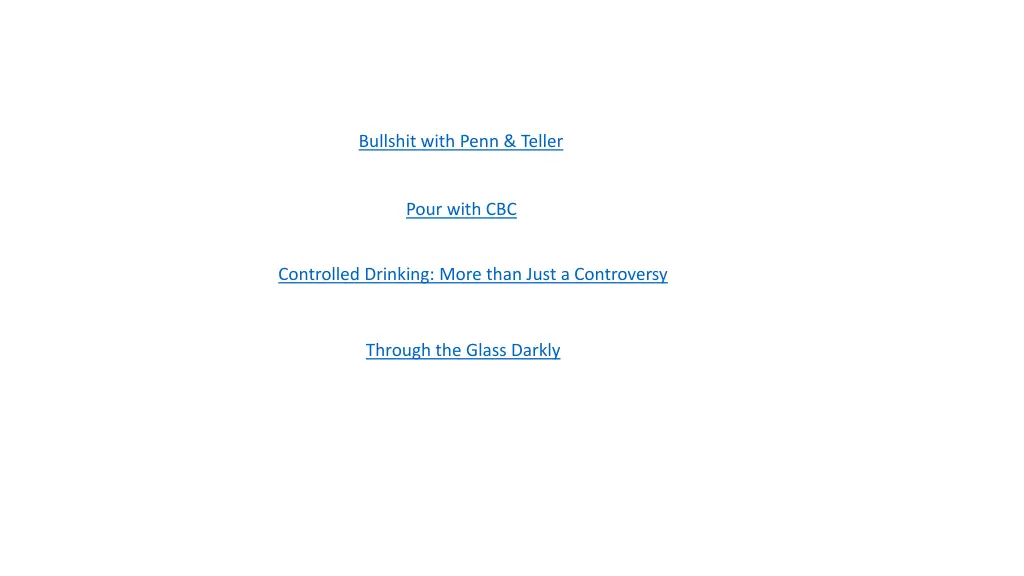
Controlled Drinking vs. Abstinence in Addiction Treatment Research
Learn about the controversial study by Mark and Linda Sobell on controlled drinking for alcoholics, the criticism they faced, and the impact on addiction treatment approaches. Explore the role of 12-step programs, the debate on harm reduction strategies, and initiatives in overdose prevention and impaired driving awareness.
Download Presentation

Please find below an Image/Link to download the presentation.
The content on the website is provided AS IS for your information and personal use only. It may not be sold, licensed, or shared on other websites without obtaining consent from the author. If you encounter any issues during the download, it is possible that the publisher has removed the file from their server.
You are allowed to download the files provided on this website for personal or commercial use, subject to the condition that they are used lawfully. All files are the property of their respective owners.
The content on the website is provided AS IS for your information and personal use only. It may not be sold, licensed, or shared on other websites without obtaining consent from the author.
E N D
Presentation Transcript
Bullshit with Penn & Teller Pour with CBC Controlled Drinking: More than Just a Controversy Controlled Drinking: More than Just a Controversy Through the Glass Darkly
Mark and Linda Sobell 1982 husband and wife PhD team at the Patton State VA Hospital used behavioral techniques to teach 20 chronic alcoholics to moderate their drinking (Individualized Behavioral Therapy for Alcoholics or Controlled Drinking) subjects were randomly assigned Reported significantly better outcomes in CD patients after one and two years when compared to 12-step abstinence-orientated programs The principle attack on the the Sobell s research came from Mary Pendery an AA advocate and alcohol and drug counsellor at Patton The attach lasted for nearly 10 years and culminated with a her joining two other professors, a psychologist from UCLA names Maltzman and West (head of UCLA s psychiatry department) and publishing a paper in Science that virtually accused the Sobell of fraud.
The Science paper became the basis of a media campaign that emphasizing the fatal effects of CD Sobells were working at the ARF (now call the centre for Addiction and Mental Health in Toronto) who dispatched 4 distinguished scientists to review the dispute ultimately clearing them of any wrong doing Supporter include Alan Marlatt at the University of Washington and Bill Miller at the University of New Mexico
Ethan Nadelmanns Tragedy of the 12 Steps and Clean Needles Where the 12-step thing has the most to own up to is it role in impeding harm reduction to stem the spread of HIV/AIDS/Hepitatis. Why was Australia, England & the Netherlands were able to stop the spread of HIV, and keep the number of injection drug users 5-10% while the US was not able to. It s that notion that abstinence is the only permissible approach, that we are going to be enabling junkies by giving them clean needles. There has to be an owning up to that role in hundreds of thousand of people dying unnecessarily
Centre for Disease Control in BC Overdose prevention and response training: Provide training and take home naloxone kits to reduce opioid overdose-related harms and deaths Impaired driving prevention campaigns: Create awareness of the risks of driving under the influence of alcohol and other legal or illegal substances Peer support programs: Groups for people who use substances - to improve their quality of life and to address gaps in services Needle distribution programs: Distribute clean needles and other harm reduction supplies and educate on their safe disposal Outreach and education: Make contact with people who use substances to encourage safer behaviour Substitution therapies: Substitute illegal heroin with legal, non-injection methadone or prescription heroin Supervised consumption facilities: Prevent overdose deaths and other harms by providing a safer, supervised environment for people using substances
Practices of the Harm Reduction Society Accepts, for better and or worse, that licit and illicit drug use is part of our world and chooses to work to minimize its harmful effects rather than simply ignore or condemn them. Understands drug use as a complex, multi-faceted phenomenon that encompasses a continuum of behaviors from severe abuse to total abstinence, and acknowledges that some ways of using drugs are clearly safer than others. Establishes quality of individual and community life and well-being not necessarily cessation of all drug use as the criteria for successful interventions and policies. Calls for the non-judgmental, non-coercive provision of services and resources to people who use drugs and the communities in which they live in order to assist them in reducing attendant harm. Ensures that drug users and those with a history of drug use routinely have a real voice in the creation of programs and policies designed to serve them. Affirms drugs users themselves as the primary agents of reducing the harms of their drug use, and seeks to empower users to share information and support each other in strategies which meet their actual conditions of use. Recognizes that the realities of poverty, class, racism, social isolation, past trauma, sex-based discrimination and other social inequalities affect both people s vulnerability to and capacity for effectively dealing with drug-related harm. Does not attempt to minimize or ignore the real and tragic harm and danger associated with licit and illicit drug use.
Harm Reduction Stratergies Clean needles/equipment Safe Injection sites Access to evidence based treatment Methadone, Suboxone, Hydromorphone (IV) and Heroin (IV) Portland Hotel Society PHS mental health workers, food program, harm reduction services and supplies, home support, medication and methadone dispensation, HIV outreach, advocacy, embedded primary care clinic, creative workshops, acupuncture and massage therapy, barber shop Controlled Drinking
